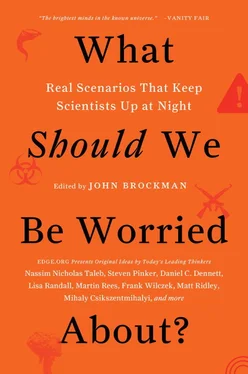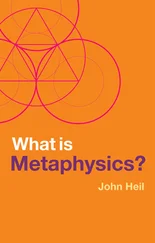This essay began with the proverbial note sketched out by hand on the back of an envelope. My fingers then picked out the words on my smartphone. My worry had been that these two processes, necessary to shape and synthesize, were somehow conflicted. I worried about our grip on technology. But the wrinkling of our fingers reminds me that we engage with the evolved and the still evolving.
SCOTT SAMPSON
Dinosaur paleontologist; research curator, Utah Museum of Natural History; author, Dinosaur Odyssey: Fossil Threads in the Web of Life
We should all be worried about the gaping psychological chasm separating humanity from nature. Indeed, a strong argument can be made that bridging this divide deserves to be ranked among the most urgent 21st-century priorities. Yet so far the human/nature divide hasn’t even made it to our cultural to-do list.
For the past several decades, numerous scientists and environmentalists have been telling us we must change our ways and strike a balance with nature or face catastrophic consequences. I have often participated in this echo chamber, doling out dire statistics in hopes of engaging people in action. The unspoken assumption has been that cold, hard facts are all that’s needed for people (including businesspeople and elected officials) to “get it” and alter their unsustainable ways. To date, however, virtually all the key indicators—from greenhouse-gas emissions to habitat and species losses—are still heading in the wrong direction.
The problem is that humans aren’t rational creatures. At least not when it comes to shifting their behaviors. As marketing executives have long understood, humans are far more susceptible to emotional messages, especially when conveyed through imagery. Want to escalate sales of some new car model? Beautiful people driving through pristine natural settings are far more powerful motivators than statistics on horsepower and fuel efficiency.
But what emotion is missing? What emotion do we need to foster a sustainable shift in human behavior? In a word, love.
As the late evolutionary biologist Stephen Jay Gould once claimed in an uncharacteristic moment of sentimentality, “We cannot win this battle to save species and environments without forging an emotional bond between ourselves and nature as well—for we will not fight to save what we do not love.” The good news is that thanks to a lengthy evolutionary tenure living in intimate contact with the nonhuman world, the capacity for forming an emotional attachment with nature probably lies dormant within all of us, waiting to be reawakened (think E. O. Wilson’s “biophilia”).
The bad news is that as a species, we’ve never been more disconnected from the natural world. Thanks to a variety of factors—among them fear of strangers and an obsession with screens—children’s firsthand encounters with nature in the developed world have dropped precipitously, to less than 10 percent of what they were just one generation ago. The average American youth now spends seven to ten hours per day staring at screens, compared to a mere handful of minutes in any “natural” setting. The result of this indoor migration is a runaway health crisis, both for children (obesity, ADHD, stress, etc.) and the places where they live.
Science has been one of the primary forces driving a wedge between humans and nature, prompting us to see nature as objects rather than subjects, resources to be exploited rather than relatives to be respected. Yet science, particularly over the past few decades, has also empirically demonstrated our complete embeddedness within nature, from the trillions of bacterial cells that far outnumber human cells in our bodies to our role as newbie actors in the 14-billion-year evolutionary epic.
Do we need more science? Of course, and the general public must learn the necessary facts, dire and difficult though they may be. We’re also going to need all the technological help we can get in navigating a sustainable path into the future. Yet knowledge and technology without emotional connection simply won’t cut it. The next generation of humans must learn to see their relationship with the natural world in ways that will seem alien to our current anthropocentric, reductionist, and materialistic perspective.
BRUCE SCHNEIER
Security technologist; author, Liars and Outliers: Enabling the Trust That Society Needs to Thrive
All disruptive technologies upset traditional power balances, and the Internet is no exception. The standard story is that it empowers the powerless, but that’s only half the story. The Internet empowers everyone. Powerful institutions might be slow to make use of that new power, but since they are powerful they can use it more effectively. Governments and corporations have woken up to the fact that not only can they use the Internet but they can also control it for their interests. Unless we start deliberately debating the future we want to live in, and the role of information technology in enabling that world, we will end up with an Internet that benefits existing power structures and not society in general.
We’ve all lived through the Internet’s disruptive history. Entire industries, like travel agencies and video rental stores, disappeared. Traditional publishing—books, newspapers, encyclopedias, music—lost power, while Amazon and others gained. Advertising-based companies like Google and Facebook gained a lot of power. Microsoft lost power (as hard as that is to believe).
The Internet changed political power as well. Some governments lost power as citizens organized online. Political movements became easier, helping to topple governments. The Obama campaign made revolutionary use of the Internet, both in 2008 and 2012.
And the Internet changed social power, as we collected hundreds of “friends” on Facebook, tweeted our way to fame, and found communities for the most obscure hobbies and interests. And some crimes became easier: Impersonation fraud became identity theft, copyright violation became file sharing, and accessing censored materials—political, sexual, cultural—became trivially easy.
Now powerful interests are looking to deliberately steer this influence to their advantage. Some corporations are creating Internet environments that maximize their profitability—Facebook and Google among many others. Some industries are lobbying for laws that make their particular business models more profitable: Telecom carriers want to be able to discriminate between different types of Internet traffic, entertainment companies want to crack down on file sharing, advertisers want unfettered access to data about our habits and preferences.
On the government side, more countries censor the Internet—and do so more effectively—than ever before. Police forces around the world are using Internet data for surveillance, with less judicial oversight and sometimes in advance of any crime. Militaries are fomenting a cyberwar arms race. Internet surveillance—both governmental and commercial—is on the rise, not just in totalitarian states but in Western democracies as well. Both companies and governments rely more on propaganda to create false impressions of public opinion.
In 1996, cyberlibertarian John Perry Barlow issued his Declaration of the Independence of Cyberspace. He told governments: “You have no moral right to rule us, nor do you possess any methods of enforcement that we have true reason to fear.” It was a utopian ideal, and many of us believed him. We believed that the Internet generation, those quick to embrace the social changes this new technology brought, would swiftly outmaneuver the more ponderous institutions of the previous era.
Reality turned out to be much more complicated. What we forgot is that technology magnifies power in both directions. When the powerless found the Internet, suddenly they had power. But while the unorganized and nimble were the first to make use of the new technologies, eventually the powerful behemoths woke up to the potential—and they have more power to magnify. And not only does the Internet change power balances but the powerful can also change the Internet. Remember how incompetent the FBI was at investigating Internet crimes in the early 1990s? Or how Internet users ran rings around China’s censors and Middle Eastern secret police? Or how digital cash was going to make government currencies obsolete, and Internet organizing was going to make political parties obsolete? Now all that feels like ancient history.
Читать дальше












